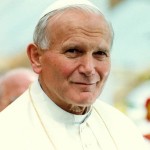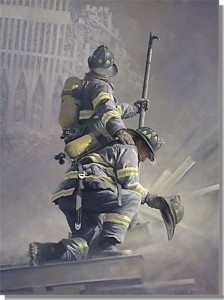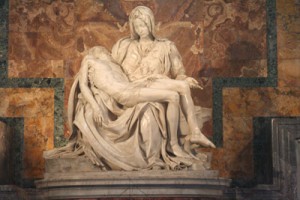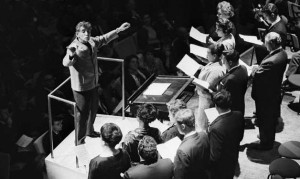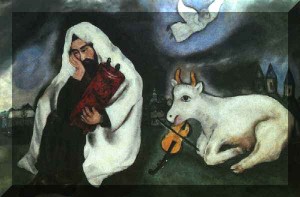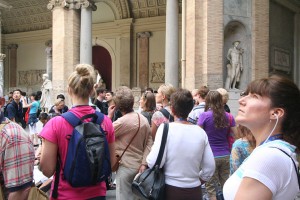Tags: catholic, catholic podcast, catholic prayer, cathollc spirituality, st. teresa of avila, the interior castle
This entry was posted on Wednesday, September 21st, 2011 at 9:32 am
You can follow any responses to this entry through the RSS 2.0 feed.
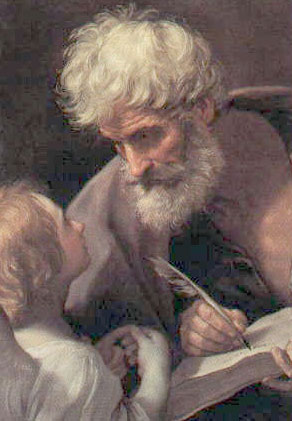 St. Matthew, one of the twelve Apostles, is the author of the first Gospel.Son of Alphaeus, he lived at Capenaum on Lake Genesareth. He was a Roman tax collector, a position equated with collaboration with the enemy by those from whom he collected taxes. Jesus’ contemporaries were surprised to see the Christ with a traitor, but Jesus explained that he had come “not to call the just, but sinners.†Matthew’s Gospel is given pride of place in the canon of the New Testament, and was written to convince Jewish readers that their anticipated Messiah had come in the person of Jesus. He preached among the Jews for 15 years; his audiences may have included the Jewish enclave in Ethiopia, and places in the East.
St. Matthew, one of the twelve Apostles, is the author of the first Gospel.Son of Alphaeus, he lived at Capenaum on Lake Genesareth. He was a Roman tax collector, a position equated with collaboration with the enemy by those from whom he collected taxes. Jesus’ contemporaries were surprised to see the Christ with a traitor, but Jesus explained that he had come “not to call the just, but sinners.†Matthew’s Gospel is given pride of place in the canon of the New Testament, and was written to convince Jewish readers that their anticipated Messiah had come in the person of Jesus. He preached among the Jews for 15 years; his audiences may have included the Jewish enclave in Ethiopia, and places in the East.
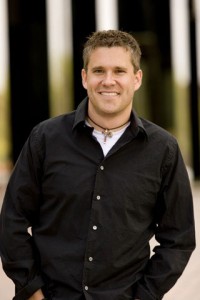 Listen to none other than Mark Hart the Bible Geek about the great work of St. Matthew…of course, the Gospel according to St. Matthew[powerpress]
Listen to none other than Mark Hart the Bible Geek about the great work of St. Matthew…of course, the Gospel according to St. Matthew[powerpress]
Personal note, my favorite Matthew passage (from Chapter 25): “When the Son of Man comes in his glory, and all the angels with him, he will sit upon his glorious throne, and all the nations will be assembled before him. And he will separate them one from another, as a shepherd separates the sheep from the goats. He will place the sheep on his right and the goats on his left. Then the king will say to those on his right, ‘Come, you who are blessed by my Father. Inherit the kingdom prepared for you from the foundation of the world. For I was hungry and you gave me food, I was thirsty and you gave me drink, a stranger and you welcomed me, naked and you clothed me, ill and you cared for me, in prison and you visited me.‘ Then the righteous will answer him and say, ‘Lord, when did we see you hungry and feed you, or thirsty and give you drink? When did we see you a stranger and welcome you, or naked and clothe you? When did we see you ill or in prison, and visit you?’ And the king will say to them in reply, ‘Amen, I say to you, whatever you did for one of these least brothers of mine, you did for me.’ Then he will say to those on his left, ‘Depart from me, you accursed, into the eternal fire prepared for the devil and his angels. For I was hungry and you gave me no food, I was thirsty and you gave me no drink, a stranger and you gave me no welcome, naked and you gave me no clothing, ill and in prison, and you did not care for me.’ Then they will answer and say, ‘Lord, when did we see you hungry or thirsty or a stranger or naked or ill or in prison, and not minister to your needs?’ He will answer them, ‘Amen, I say to you, what you did not do for one of these least ones, you did not do for me.’ And these will go off to eternal punishment, but the righteous to eternal life.”
Tags: apostle, catholic, catholic podcast, catholic prayer, cathollc spirituality, gospel of matthew, levi, martyr, st matthew, tax collectors
This entry was posted on Wednesday, September 21st, 2011 at 12:23 am
You can follow any responses to this entry through the RSS 2.0 feed.
an excerpt from Pope John Paul II’s homily….
 MASS FOR THE CANONIZATION OF KOREAN MARTYRS
Youido Place – Seoul
Sunday, 6 May 1984“Was it not necessary that the Christ should suffer these things and enter into his glory“? (Luc. 24, 26)
3. The truth about Jesus Christ also reached Korean soil. It came by means of books brought from China. And in a most marvellous way, divine grace soon moved your scholarly ancestors first to an intellectual quest for the truth of God’s word and then to a living faith in the Risen
Savior.
Yearning for an ever greater share in the Christian faith, your ancestors sent one of their own in 1784 to Peking, where he was baptized. From this good seed was born the first Christian community in Korea, a community unique in the history of the Church by reason of the fact that it was founded entirely by lay people. This fledgling Church, so young and yet so strong in faith, withstood wave after wave of fierce persecution. Thus, in less than a century, it could already boast of some ten thousand martyrs. The years 1791, 1801, 1827, 1839, 1846 and 1866 are forever signed with the holy blood of your Martyrs and engraved in your hearts.
Even though the Christians in the first half century had only two priests from China to assist them, and these only for a time, they deepened their unity in Christ through prayer and fraternal love; they disregarded social classes and encouraged religious vocations. And they sought ever closer union with their Bishop in Peking and the Pope in faraway Rome.
After years of pleading for more priests to be sent, your Christian ancestors welcomed the firstFrench missionaries in 1836. Some of these, too, are numbered among the Martyrs who gave their lives for the sake of the Gospel, and who are being canonized today in this historic celebration.
The splendid flowering of the Church in Korea today is indeed the fruit of the heroic witness of the Martyrs. Even today, their undying spirit sustains the Christians in the Church of silence in the North of this tragically divided land.
4. Today then it is given to me, as the Bishop of Rome and Successor of Saint Peter in that Apostolic See, to participate in the Jubilee of the Church on Korean soil. I have already spent several days in your midst as a pilgrim, fulfilling as Bishop and Pope my service to the sons and daughters of the beloved Korean nation. Today’s Liturgy constitutes the culminating point of this pastoral service.
For behold: through this Liturgy of Canonization the Blessed Korean Martyrs are inscribed in the list of the Saints of the Catholic Church. These are true sons and daughters of your nation, and they are joined by a number of missionaries from other lands. They are your ancestors, according to the flesh, language and culture. At the same time they are your fathers and mothers in the faith, a faith to which they bore witness by the shedding of their blood.
From the thirteen-year-old Peter Yu to the seventy-two-year-old Mark Chong, men and women, clergy and laity, rich and poor, ordinary people and nobles, many of them descendants of earlier unsung martyrs – they all gladly died for the sake of Christ.
Listen to the last words of Teresa Kwon, one of the early Martyrs: “Since the Lord of Heaven is the Father of all mankind and the Lord of all creation, how can you ask me to betray him? Even in this world anyone who betrays his own father or mother will not be forgiven. All the more may I never betray him who is the Father of us all”.
A generation later, Peter Yu’s father Augustine firmly declares: “Once having known God, I cannot possibly betray him”. Peter Cho goes even further and says: “Even supposing that one’s own father committed a crime, still one cannot disown him as no longer being one’s father. How then can I say that I do not know the heavenly Lord Father who is so good?”.
And what did the seventeen-year-old Agatha Yi say when she and her younger brother were falsely told that their parents had betrayed the faith? “Whether my parents betrayed or not is their affair. As for us, we cannot betray the Lord of heaven whom we have always served”. Hearing this, six other adult Christians freely delivered themselves to the magistrate to be martyred. Agatha, her parents and those other six are all being canonized today. In addition, there are countless other unknown, humble martyrs who no less faithfully and bravely served the Lord.
5. The Korean Martyrs ave borne witness to the crucified and risen Christ. Through the sacrifice
of their own lives they have become like Christ in a very special way. The words of Saint Paul the Apostle could truly have been spoken by them: We are “always carrying in the body the death of Jesus, so that the life of Jesus may also be manifested in our bodies . . . We are always being given up to death for Jesus’ sake, so that the life of Jesus may be manifested in our mortal flesh”.
The death of the martyrs is similar to the death of Christ on the Cross, because like his, theirs has become the beginning of new life. This new life was manifested not only in themselves – in those who underwent death for Christ – but it was also extended to others. It became the leaven of the Church as the living community of disciples and witnesses to Jesus Christ. “The blood of martyrs is the seed of Christians“: this phrase from the first centuries of Christianity is confirmed before our eyes. (more…)
Tags: catholic, catholic podcast, catholic prayer, cathollc spirituality, martyrs
This entry was posted on Tuesday, September 20th, 2011 at 10:13 am
You can follow any responses to this entry through the RSS 2.0 feed.
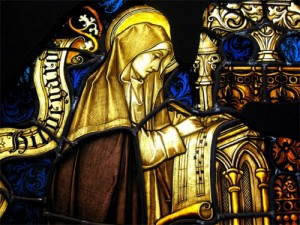 800+Â years later,
800+Â years later,
it still holds up….
now that’s the work of
the Holy Spirit!
Tags: catholic, catholic podcast, catholic prayer, cathollc spirituality, chant, mystic, mystic of the Church, st hildegard of bingen, st. hildegarde, women of the middle ages, work
This entry was posted on Saturday, September 17th, 2011 at 5:00 pm
You can follow any responses to this entry through the RSS 2.0 feed.
VATICAN CITY, 14 SEP 2011 (VIS) –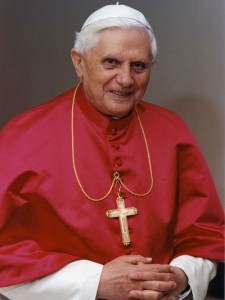
This morning the Holy Father travelled by helicopter from the Apostolic Palace at Castelgandolfo to the Vatican, where he held his weekly general audience in the Paul VI Hall. In his catechesis he dwelt on the first part of Psalm 22, focusing on the theme of prayers of supplication to God.
The Psalm, which remerges in the narrative of Christ’s Passion, presents the figure of an innocent man persecuted and surrounded by adversaries who seek his death. He raises his voice to God “in a doleful lament which, in the certainty of faith, mysteriously gives way to praise”.
The Psalmist’s opening cry of “my God, my God, why have you forsaken me?” is “an appeal addressed to a God Who appears distant, Who does not respond”, said the Holy Father. “God is silent, a silence that rends the Psalmists heart as he continues to cry out incessantly but finds no response”. Nonetheless, he “calls the Lord ‘my’ God, in an extreme act of trust and faith. Despite appearances, the Psalmist cannot believe that his bond with the Lord has been severed entirely”.
The opening lament of Psalm 22 recurs in the Gospels of Matthew and Mark in the cry the dying Jesus makes from the cross. This, Benedict XVI explained, expresses all the desolation the Son of God felt “under the crushing burden of a
mission which had to pass through humiliation and destruction. For this reason He cried out to the Father. … Yet His was not a desperate cry, as the Psalmist’s was”.
Violence dehumanises
Sacred history, the Pope continued, “has been a history of cries for help from the people, and of salvific responses from God”. The Psalmist refers to the faith of his ancestors “who trusted … and were never put to shame”, and he describes his own extreme difficulties in order “to induce the Lord to take pity and intervene, as He always had in the past”.
The Psalmist’s enemies surround him, “they seem invincible, like dangerous ravening beasts. … The images used in the Psalm also serve to underline the fact that when man himself becomes brutal and attacks his fellow man, … he seems to lose all human semblance. Violence always contains some bestial quality, and only the salvific intervention of God can restore man to his humanity”.
At this point, death begins to take hold of the Psalmist. He describes the moment with dramatic images “which we come across again in the narrative of Christ’s Passion: the bodily torment, the unbearable thirst which finds an echo in Jesus’ cry of ‘I am thirsty’, and finally the definitive action of his tormenters who, like the soldiers under the cross, divide among themselves the clothes of the victim, whom they consider to be already dead”.
At this point a new cry emerges, “which rends the heavens because it proclaims a faith, a certainty, that is beyond all doubt. … The Psalm turns into thanksgiving. … The Lord has saved the petitioner and shown him His face of mercy. Death and life came together in an inseparable mystery and life triumphed. … This is the victory of faith, which can transform death into the gift of life, the abyss of suffering into a source of hope”. Thus the Psalm leads us to relive Christ’s Passion and to share the joy of His resurrection.
In closing, the Pope invited the faithful to distinguish deeper reality from outward appearance, even when God is apparently silent. “By placing all our trust and hope in God the Father, we can pray to Him with faith at all moments of anguish, and our cry for help will turn into a hymn of praise”.
AG/ VIS 20110914 (630)
Published by VISarchive 02 – Wednesday, September 14, 2011
Tags: catholic, catholic podcast, catholic prayer, cathollc spirituality, pope benedict xvi, psalm 22
This entry was posted on Wednesday, September 14th, 2011 at 9:34 am
You can follow any responses to this entry through the RSS 2.0 feed.
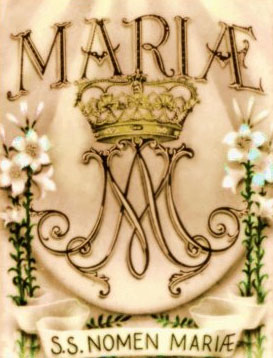 Ave Maria…the invocation of the name of Mary is a powerful prayer…Ave Maria…every time we say it we cry out to our Mother. What mother doesn’t rush to the aid of her child when he or she cries out her name? Hail Mary. Not just a name, but a supreme gift of grace to us all…the gift of a mother who loves unconditionally, who loves always, who loves each and every one of her children given to her by God.  Hail Mary, when we say it we unlatch the door and allow our mother in, when we say it we pick up the phone and converse with the greatest of human counselors, when we say it we acknowledge the reality of the presence of the “Woman” clothed with the Sun, with the moon under her feet, crowned with the stars who labors to see all of her children “birthed” into heaven. Mary….Mary….Mary.  The Holy Name of….Mary.
Ave Maria…the invocation of the name of Mary is a powerful prayer…Ave Maria…every time we say it we cry out to our Mother. What mother doesn’t rush to the aid of her child when he or she cries out her name? Hail Mary. Not just a name, but a supreme gift of grace to us all…the gift of a mother who loves unconditionally, who loves always, who loves each and every one of her children given to her by God.  Hail Mary, when we say it we unlatch the door and allow our mother in, when we say it we pick up the phone and converse with the greatest of human counselors, when we say it we acknowledge the reality of the presence of the “Woman” clothed with the Sun, with the moon under her feet, crowned with the stars who labors to see all of her children “birthed” into heaven. Mary….Mary….Mary.  The Holy Name of….Mary.
This has become for me a very precious feast day.  Once, when I was traveling on a personal pilgrimage alone, I was feeling achingly isolated, rejected and lost, literally thousands of miles from home. A terrible darkness had shrouded over me emotionally and spiritually. In a very poignant and unexpected way, Our Lady made her presence known to me on this date. It would involve an encounter with a little woman from Africa who looked like my grandmother and spoke no English, and a long plane ride home..this coming together would grow into a gentle, loving exchange  between strangers…I didn’t realize it, but it was what my broken “pierced” heart had been aching for.  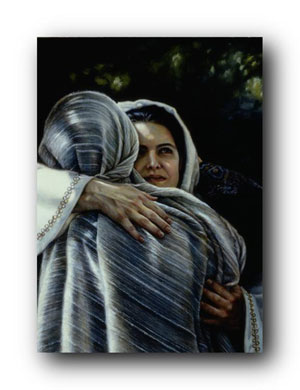 Without fanfare or expectation, out of nowhere came the name of Mary, literally…a moment which illuminated for me the bright light of the Blessed Mother’s presence, and not just at that particular moment in time. Like the brightest star in the night sky, it became clear to me that she had been there truly, truly guiding me all along, even in the darkest moments of doubt and pain.  That she had not, and would never, “leave me alone”.  That I was indeed responding to HER call and in turn she had responded to mine. Mary. It was she who traveled with me on that journey and who would continue to do so in the days and years ahead. Mary.
Without fanfare or expectation, out of nowhere came the name of Mary, literally…a moment which illuminated for me the bright light of the Blessed Mother’s presence, and not just at that particular moment in time. Like the brightest star in the night sky, it became clear to me that she had been there truly, truly guiding me all along, even in the darkest moments of doubt and pain.  That she had not, and would never, “leave me alone”.  That I was indeed responding to HER call and in turn she had responded to mine. Mary. It was she who traveled with me on that journey and who would continue to do so in the days and years ahead. Mary.
Well, the entirety of this story is really for another time, I just wanted to share with those who may read this, that I, unqualified and without hesitation,  with my whole unworthy heart, love Our Blessed Mother…I love “Mary”. I hope and pray you do too. If not, listen today for her name…call out to the one who is waiting…she WILL race to your aid. Mary. She is your mother, a gift to us all from her Son, our Savior, Jesus Christ. A precious, precious gift. Do not toss her aside.  She will never, ever leave you alone.
Father, in the video below, talks about the orgin of this feast day… it’s really quite a lovely homily.
Tags: ave maria, blessed mother, catholic, catholic podcast, catholic prayer, cathollc spirituality, holy name of mary
This entry was posted on Monday, September 12th, 2011 at 7:40 am
You can follow any responses to this entry through the RSS 2.0 feed.
.
Prayer of Pope Benedict XVI at Ground Zero
“We ask you, in your compassion to bring healing to those who, because of their presence here that day, suffer from injuries and illness. Heal, too, the pain of still-grieving families and all who lost loved ones in this tragedy. Give them strength to continue their lives with courage and hope.
“We are mindful as well of those who suffered death, injury, and loss on the same day at the Pentagon and in Shanksville, Pennsylvania. Our hearts are one with theirs as our prayer embraces their pain and suffering.
“God of peace, bring your peace to our violent world: peace in the hearts of all men and women and peace among the nations of the Earth. Turn to your way of love those whose hearts and minds are consumed with hatred.
“God of understanding, overwhelmed by the magnitude of this tragedy, we seek your light and guidance as we confront such terrible events. Grant that those whose lives were spared may live so that the lives lost here may not have been lost in vain. Comfort and console us, strengthen us in hope, and give us the wisdom and courage to work tirelessly for a world where true peace and love reign among nations and in the hearts of all.” AMEN
Tags: 9-11, catholic, catholic podcast, catholic prayer, cathollc spirituality, ground zero, pope benedict xvi
This entry was posted on Sunday, September 11th, 2011 at 3:59 am
You can follow any responses to this entry through the RSS 2.0 feed.
EWTN Global Catholic Television Network: EWTN Live – Fr. Mitch Pacwa, SJ – Fr. David J. Simonetti – The Benefits of Spiritual Direction
Fr. Simonetti spoke on the topic of Spiritual Direction on EWTN last night, and spoke for a few minutes about his time with IPF’s Spiritual Direction Training Program
Tags: catholic, catholic podcast, catholic prayer, cathollc spirituality, David J. Simonetti, Global Catholic Television Network, spiritual direction
This entry was posted on Friday, September 9th, 2011 at 5:12 pm
You can follow any responses to this entry through the RSS 2.0 feed.
DIALECTIC OF PRAYER: HUMAN CRY AND DIVINE RESPONSE
VATICAN CITY, 7 SEP 2011 (VIS) – This morning Benedict XVI travelled by helicopter
from the Apostolic Palace in Castelgandolfo to the Vatican for his weekly general audience in St. Peter’s Square.
Continuing a series of catecheses on the subject of “the school of prayer”, the Holy Father turned his attention to Psalm 3 which recounts David’s flight from Jerusalem when Absalom rose against him. “In the Psalmist’s lament”, the Pope said, “each of us may recognise those feelings of pain and bitterness, accompanied by faith in God, which, according the biblical narrative, David experienced as he fled from his city”.
In the Psalm, the king’s enemies are many and powerful, and the imbalance between David’s forces and those of his persecutors “justifies the urgency of his cry for help”. Nonetheless his adversaries “also seek to break his bond with God and to undermine the faith of their victim by insinuating that the Lord cannot intervene”.
Thus, the aggression “is not only physical, it also has a spiritual dimension” aimed at “the central core of the Psalmist’s being. This is the extreme temptation a believer suffers: the temptation of losing faith and trust in the closeness of God”, the Holy Father said.
Yet, as the Book of Wisdom says, the unrighteous are mistaken because “the Lord … is like a shield protecting those who entrust themselves to Him. He causes them to raise their heads in sign of victory. Man is no longer alone … because the Lord hears the cry of the oppressed. … This intertwining of human cry and divide response is the dialectic of prayer and the key to reading the entire history of salvation. A cry expresses a need for help and appeals to the faithfulness of the other. To cry out is an act of faith in God’s closeness and His willingness to listen. Prayer express the certainty of a divine presence which has already been experienced and believed, and which is fully manifested in the salvific response of God”.
Psalm 3 presents us “a supplication replete with faith and consolation. By praying this Psalm we share the sentiments of the Psalmist: a just but persecuted figure which would later be fulfilled in Jesus. In pain, danger and the bitterness of misunderstanding and offence, the words of this Psalm open our hearts to the comforting certainty of faith. God is always close, even in times of difficulty, problems and darkness. He listens, responds and saves.
“However”, the Pope added, “it is important to be able to recognise His presence and to accept His ways: like David during his humiliating flight from his son Absalom, like the persecuted righteous of the Book of Wisdom and, finally and fully, like the Lord Jesus on Golgotha. In the eyes of the unrighteous it appeared that God did not intervene and that His Son died, but for believers it was at that precise moment that true glory was manifested and definitive salvation achieved”.
The Pope concluded: “May the Lord give us faith, may He come in aid of our weakness and help us to pray in moments of anguish, in the painful nights of doubt and the long days of pain, abandoning ourselves trustingly to Him, our shield and our glory”.
AG/ VIS 20110907 (550)
PSALM 3 From the New Advent On-line Bible:
1 The psalm of David when he fled from the face of his sonAbsalom.
 hy, OÂ Lord, are they multiplied that afflict me? many are they who rise up against me.
hy, OÂ Lord, are they multiplied that afflict me? many are they who rise up against me.
3 Many say to mysoul: There is no salvation for him in his God.
4 But you, O Lord, are my protector, my glory, and the lifter up of my head.
5 I have cried to the Lord with my voice: and he has heard me from his holy hill.
6 I have slept and have taken my rest: and I have risen up, because the Lord has protected me.
7 I will not fear thousands of the people surrounding me: arise, O Lord; save me, O my God.
8Â For you have struck all them who are my adversaries without cause: you have broken the teeth of sinners.
9 Salvation is of the Lord: and your blessing is upon your people.
Tags: catholic, catholic podcast, catholic prayer, cathollc spirituality, pope benedict, prayer, psalms
This entry was posted on Wednesday, September 7th, 2011 at 7:30 am
You can follow any responses to this entry through the RSS 2.0 feed.
Tags: blessed mother teresa of calcutta, catholic, catholic podcast, catholic prayer, cathollc spirituality
This entry was posted on Monday, September 5th, 2011 at 6:24 am
You can follow any responses to this entry through the RSS 2.0 feed.
Tags: catholic, catholic podcast, catholic prayer, cathollc spirituality, sins of omission
This entry was posted on Sunday, September 4th, 2011 at 7:37 am
You can follow any responses to this entry through the RSS 2.0 feed.
Tags: catholic, catholic podcast, catholic prayer, cathollc spirituality, michaelangelo, Michelangelo, Miguel Angel, Renacentista
This entry was posted on Saturday, September 3rd, 2011 at 9:24 pm
You can follow any responses to this entry through the RSS 2.0 feed.
Tags: catholic, catholic podcast, catholic prayer, cathollc spirituality
This entry was posted on Thursday, September 1st, 2011 at 3:11 pm
You can follow any responses to this entry through the RSS 2.0 feed.
On Wednesday Pope Benedict XVI challenged the men and women of today’s
world to recover the deepest meaning of art, in its multitude of expressions, but particularly as the path of beauty which leads to God. And in doing so he also shared personal memories of how art had moved him to God with the five thousand pilgrims gathered for the general audience in the tiny village of Castel Gandolfo.
He said “On several occasions during this period, I have recalled the need for every Christian to find time for God, for prayer, amid the many occupations of our daily lives. The Lord Himself gives us many opportunities to remember Him. Today I will touch briefly on one of these channels that can bring us to God and also be of help in encountering Him: it is the path of artistic expression, part of that “path of Beauty “, of which I have spoken several times and which man today should recover in its deepest meaningâ€.
Pope Benedict continued “perhaps sometimes, before a sculpture, a painting, a few verses of a poem or a song, you have experienced deep within an intimate emotion, a sense of joy, that is, you have clearly perceived that in front of you there was not only mere matter, a piece of marble or bronze, a painted canvas, a series of letters or a combination of sounds, but something bigger, something that speaks, capable of touching the heart, of communicating a message; of elevating the soul. ”
“Works of art are the fruit of human creativity, which question the visible reality, trying to discover its deep meaning and to communicate it through the language of shapes, colours, sounds.” The work of art, in short, “is an open door on the infinite,” which “opens the eyes of the mind, of the heart.”
However, he added, “there are artistic expressions that are true paths to God, the supreme Beauty, indeed they help nurture our relationship with Him in prayer. These are works that are born of faith and express faith. One example of this is when we visit a Gothic cathedral; we are enraptured by the vertical lines that shoot up towards the sky and draw our eyes and our spirits upwards, while at the same time, we feel small, and yet eager for fullness … Or when we enter a Romanesque church: we are spontaneously invited to recollection and prayer. We feel as if the faith of generations were enclosed in these splendid buildings. Or, when we hear a piece of sacred music that vibrates the strings of our heart, our soul expands and helped to turn to God. A concert of music by Johann
Sebastian Bach, in Munich, directed by Leonard Bernstein, again comes to my mind. Afterthe last piece of music, one of the Cantate, I felt, not by reasoning, but in my heart, that what I heard had conveyed to me truth, something of the truth of the great composer’s faith and this pressed me to praise and thank the Lord and beside me was the Lutheran Bishop of Munich and spontaneously, feeling this, I said to him, you know, its true, a faith and beauty so strong and irresistibly expresses the presence and truth of God”.
Pope Benedict then turned spoke of how certain artists have touched our lives : “How many times have paintings or frescoes, the fruit of the faith of the artist, in their forms, their colours, their light, encouraged us to direct our thoughts to God and nourished in us the desire to draw from the source of all beauty. What the great artist, Marc Chagall, once
wrote remains true, that for centuries painters have dipped their paintbrush in that coloured alphabet that is the Bible. How many times, then can artistic expressions be occasions to remind us of God, to help our prayer or for the conversion of the heart! Paul Claudel, a poet, playwright, and French diplomat, in the Basilica of Notre Dame in Paris, in 1886, while he was listening to the singing of the Magnificat at Christmas Mass, felt God’s presence. He had not entered the church for reasons of faith, but to in search of arguments against Christians, and instead the grace of God worked in his heart”.
The Holy Father concluded: “I invite you to rediscover the importance of this path for prayer, for our living relationship with God. The cities and towns all over the world preserve works of art that express the faith and remind us of our relationship with God. Visiting places of art, it is not only an occasion for cultural
enrichment, but above all it can be a moment of grace, an encouragement to strengthen our relationship and our dialogue with the Lord, to stop and contemplate, in the transition from simple external reality to a deeper reality, the ray of beauty that strikes us, that almost wounds us in our inner selves and invites us to rise towards God. “
And then he greeted all English speaking pilgrims present: I am pleased to greet the English-speaking pilgrims and visitors here today, especially those from Scotland and Malta. Today we reflect on the need to draw near to God through the experience and appreciation of artistic beauty. Art is capable of making visible our need to go beyond what we see and it reveals our thirst for infinite beauty, for God. Dear friends, I invite you to be open to beauty and to allow it to move you to prayer and praise of the Lord. May Almighty God bless all of you!
Tags: art, catholic, catholic podcast, catholic prayer, cathollc spirituality, music, pope benedict xvi, prayer
This entry was posted on Thursday, September 1st, 2011 at 1:00 am
You can follow any responses to this entry through the RSS 2.0 feed.
Tags: Ave Maris Stella-Giovanni Pierluigi, catholic, catholic podcast, catholic prayer, cathollc spirituality, Sandro Botticelli
This entry was posted on Saturday, August 27th, 2011 at 9:07 pm
You can follow any responses to this entry through the RSS 2.0 feed.

